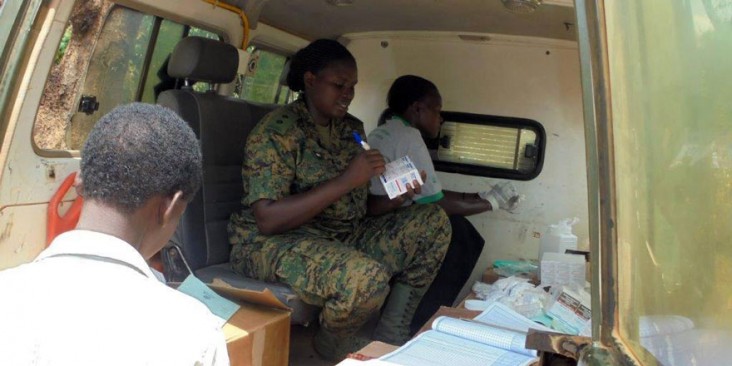- What We Do
- Agriculture and Food Security
- Democracy, Human Rights and Governance
- Economic Growth and Trade
- Education
- Ending Extreme Poverty
- Environment and Global Climate Change
- Gender Equality and Women's Empowerment
- Global Health
- Water and Sanitation
- Working in Crises and Conflict
- U.S. Global Development Lab

What Is Antiretroviral Therapy Optimization?
Antiretroviral therapy (ART) optimization is the harmonization of global efforts to accelerate access to simpler, safer and more affordable HIV treatment. To meet the needs of people in low- and middle-income countries, HIV treatment must be effective, safe, well-tolerated and affordable. Treatment must also be easy-to-use for women of childbearing age, children, and people with TB, malaria and other co-infections – groups that make up a significant proportion of people living with HIV. The systematic use of more potent and lower-cost drugs that meet these conditions enable countries to extend lifesaving treatment to a greater number of people living with HIV, which also allows development dollars to stretch even further.
USAID’s Response
Aligning the collective power of scientists, drug regulators, pharmaceutical companies, donors, programmers and advocates can rapidly advance global ART optimization efforts and will ultimately help get more people on critical HIV treatment for less money. The U.S. Agency for International Development (USAID) supports innovative partnerships to accomplish this goal through its investment in a collaboration called OPTIMIZE. This South African-led consortium brings together a diverse set of partners to leverage each partner’s unique expertise in research, manufacturing, market access, program implementation and community and advocacy engagement. Under the leadership of Wits RHI, OPTIMIZE includes founding partners ICAP at Columbia University‚ Mylan Laboratories‚ the University of Liverpool and the Medicines Patent Pool. As an expanding partnership aimed at harnessing multiple stakeholders’ collective efforts, the consortium also includes the the St. Stephen’s AIDS Trust (SSAT), the University of Cape Town and contributions from private sector partners.
OPTIMIZE collaborates to develop a wide range of approaches, including:
- Filling critical gaps in clinical trial data
- Applying innovative technologies to generate multiple, enhanced treatment options
- Supporting sustainable and competitive markets through global access initiatives
- Accelerating access to optimized ART in low- and middle-income countries
OPTIMIZE represents USAID’s commitment to support innovative solutions that directly address challenging development problems, like HIV care and treatment programming. These efforts build on the technical leadership of USAID’s Center for Accelerating Innovation and Impact, which applies business-minded/private sector approaches to the development, introduction and scale-up of health interventions to accelerate their impact on the world's most important health challenges, including HIV.
USAID’s Approach
As efforts continue to accelerate to meet the UNAIDS 90-90-90 targets and align with the World Health Organization’s Test and Start Guidelines, USAID is proud to support innovative, partnership-based approaches like ART optimization that maximize development investments and bring better, more affordable HIV medications to those who need them most.
USAID’s approach to ART Optimization focuses on accelerating treatment access through three key areas of collaboration in close alignment with UNITAID, WHO, the Global Fund to Fight AIDS, Tuberculosis and Malaria, the Bill & Melinda Gates Foundation and their partners represented by the ART Optimization Programme Advisory Committee:
- Building scientific consensus to identify and address the clinical trial data gaps required to obtain global and country-specific regulatory approvals for optimized ART.
This approach of extensive collaboration with a broad range of scientific partners, drug companies, donors, research affiliates and advocacy groups within the local and global arenas led to the ADVANCE trial, launched in January 2017. ADVANCE is designed to generate evidence to replace the current standard of care for first-line HIV treatment with a new fixed-dose regimen of two antiretroviral medications: dolutegravir (DTG) and tenofovir alafenamide (TAF). Additional trials to accelerate access for lower-dose first-line (efavirenz) and second-line alternative (darunavir/ritonavir) combinations are also underway.
- Harnessing innovative technologies and processes to dramatically reduce drug dosages and cost, while maintaining optimized ART’s effectiveness.
USAID supports research to create pills that are less expensive to manufacture and require fewer active ingredients to achieve the same impact as currently available pills. This process, called nanoformulation, could reduce the burden on country health systems and maximize the number of people living with HIV on ART by requiring fewer financial resources to procure the same number of pills currently available.
- Working globally and locally to support sustainable, competitive ART markets and accelerate the introduction of optimized ART at the country level.
Proactively integrating both private and public sector expertise is critical to quickly and efficiently launch improved ART regimens in the areas hardest hit by the HIV epidemic. Leveraging public and private industry know-how can:
-
- Address manufacturing, distribution and policy bottlenecks
- Harness advocacy approaches to support coordinated country launch planning
- Rapidly decrease the time between the development of global guidelines and the scale-up of national regulatory approval and patient uptake
Additional Resources
- South Africa Needs Assessment for Optimized Antiretroviral Drugs and Regimens [PDF, 4.1MB]
- Accelerating Access to Simpler, Safer and More Affordable HIV Treatment through ART Optimization [PDF, 2.4MB]
- SA Organizations Chosen to Address HIV and AIDS Globally
- Cutting the Cost of South African Antiretroviral Therapy Using Newer, Safer Drugs
- First-In-Humans Trials Demonstrate Nanoformulations’ Ability to Transform HIV Treatment
- Antiretroviral Therapy Optimization Trial Timeline [PDF, 1.1MB]
- ADVANCE Trial Fact Sheet [PDF, 3.8MB]
- WHRI052 Trial Fact Sheet [PDF, 3.7MB]
- SSAT062 Trial Fact Sheet [PDF, 3.7MB]







Comment
Make a general inquiry or suggest an improvement.